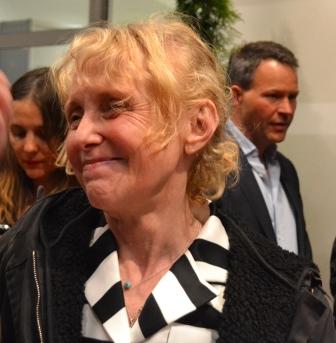"Boy that was so good!" said a fellow journalist coming out of the premiere of Claire Denis' Bastards in the Grand Lumiere theater.
"The film?" I said.
"No, the people in the audience! Imagine: Catherine Deneuve, Costa-Gavras, Amat Escalante...."
In fact, people who were not stars were the minority in the theater.
Claire Denis, Julie Bataille, Chiara Mastroianni
As for the film itself, the story of....the story of...
It confused audience members. There is a ship captain (Vincent Lindon) who comes back to Paris to help his niece (Lola Creton), who is lying in the hospital after having been violently abused with a corn cob in sexual games that she seems to have willingly participated in. Then we have the girl's weeping mother (Julie Bataille), who is in angst most of the time, both because of the daughter's perversity and her husband's recent suicide.
A parallel story also exists: the ship captain is having a sensuous affair with a married woman (Chiara Mastroianni) married to a repulsive older rich man, who may be behind the niece's trauma.
That's it. Still a brooding mystery exists in this somber film where no one smiles (except in one exceptional moment where Chiara grins at her little boy). We are supposed to wonder about this perverse sex gang.
Most of the time, I was wondering who "Jacques" was. At one point, a character mentions a man named "Jacques", clearly an important man in this saga.
"Who's Jacques?" I whispered to the man next to me, part of the crew of another film in competition.
He shrugged.
I asked ten more people after the screening: "Who is Jacques????"
Nobody knew. A few were more lost than I as they assumed the movie was in flashback, when actually it was, for the most part, in chronological time.
It turns out Jacques is the father, and the whole story pivots around knowing that.
Tant pis.
While the murky beginning, lack of character development and confusion made the film frankly boring--a general consensus here at Cannes-- the last twenty minutes of the film are stunning: full of action and psychological intensity, including one of the best car and sexual tension scenes in the history of film. Perhaps the film is saying something about the human propensity towards perversity, the sordid story underneath family relations?
In fact, this ending made me almost wish to see the film again to understand it---except it was easier to just ask Claire Denis herself.
"Perversity? What perversity? This story is tragic not perverse," Claire Denis said charmingly, dressed all in black, at the poolside of the Park Suites Hotel in Cannes. "Perversity does not have a big presence in my life."
"You must admit your film is rather dark," I said.
"Almost as dark as that," Claire smiled and pointed at the blackening clouds overhead.
"No, darker," I said.
A fellow journalist interjected that he found the film very alluring, like her other films, in the use of the body. (A lead, I thought, a way to understand this film!) It is true, the camera has lingering shots of Chiara Mastroianni's lovely curves, as well as--even better--Vincent Landon's masculine chest.
"Yes," Claire conceded. "The film started for me with an idea I had after watching some Kurosawa films of the 1950s and 60s, in which the lead character is Toshiro Mifune. I always thought Vincent Lindon had a sexy body, a body you can trust, a solid body you can lean on. In Kurosawa's films, the tragedy is that this strong man was crushed by corruption or mistrust at the end. My film started with that body."
She mused on her own relation to the body: "When making a film, if I feel nothing in my body, I can't work. I have to touch. I have to feel. I never stop touching."
This male protective body, symbolized by Vincent Lindon's own, is bound to fail, she noted. In fact this uncle (plot spoiler) does not go very far in saving his errant family. "He has been away," Claire explained. "So he does not know how this predatory world can destroy him. The predatory is something that upsets me often. It is a fear for me. Predation, intrusion..."
"Why?" I asked. "Why are you so afraid? It's not so often that we are confronted with predators."
She raised an eyebrow. "Not so often?" she laughed. "What country are you from? It happens all the time! People are always preying on us."
"True," I admitted.
As for the fact that the characters are elliptical and don't say very much, Claire Denis responded firmly:
"I think they speak enough. They speak enough for me to understand them. What more can they say?"


